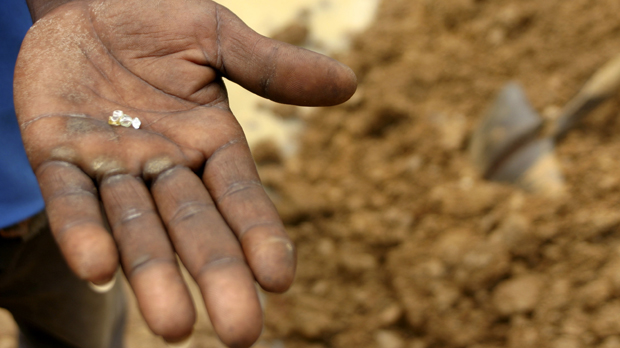‘Blood diamond’ process flawed, say campaigners
The president of the World Diamond Council tells Channel 4 News the Kimberley process means consumers know their diamonds are not from conflict areas – but campaigners disagree as they pull out.
The campaign group Global Witness has pulled out of the Kimberley process as an official observer, over what it called the body’s “refusal to address the clear links between diamonds, violence, and tyranny”.
In a statement, the group said it was pulling out of the international certification scheme because “flaws and loopholes in the process have not been fixed”.
It said the Kimberley Process, which was introduced to prevent diamond sales from financing rebellious movements, had now become an “accomplice to diamond laundering.”
“Nearly nine years after the Kimberley process was launched, the sad truth is that most consumers still cannot be sure where their diamonds come from, nor whether they are financing armed violence or abusive regimes” said Charmian Gooch, a founding director of Global Witness.
Nearly nine years after the Kimberley process was launched, the sad truth is that most consumers still cannot be sure where their diamonds come from. Global Witness
“The scheme has failed three tests: it failed to deal with the trade in conflict diamonds from Côte d’Ivoire, was unwilling to take serious action in the face of blatant breaches of the rules over a number of years by Venezuela, and has proved unwilling to stop diamonds fuelling corruption and violence in Zimbabwe.
The Kimberley Process requires participant countries to ensure that diamonds from the country are not financing rebel groups, that no diamond is imported or exported to a non-member of the scheme, and that every diamond is accompanied with a KP certificate.
Marange diamonds
Global Witness said the decision in November to authorise exports from two companies operating in the Marange diamond fields in Zimbabwe was “shocking”.
The group cited Human Rights Watch evidence saying 200 small-scale illegal miners were killed when government forces seized control of the area in 2008. Kimberley investigators also confirmed abuses that resulted in a ban on the region’s diamonds since 2009.
Global Witness believes mining licences were then granted in “legally questionable” circumstances to several companies, some of which were aligned to Robert Mugabe’s Zanu PF Party.

“Over the last decade, elections in Zimbabwe have been associated with the brutal intimidation of voters. Orchestrating this kind of violence costs a lot of money.
“As the country approaches another election, there is a very high risk of Zanu PF hardliners employing these tactics once more and using Marange diamonds to foot the bill. The Kimberley Process’s refusal to confront this reality is an outrage,” Ms Gooch said.
But following months of negotiations, the EU’s foreign policy chief Catherine Ashton welcomed a decision to resume sales from the Marange fields.
“After months of intensive negotiations with all parties, an agreement has now been reached… which protects the integrity of the KP, respects the core concerns of Zimbabwe and the EU, recognises the concerns of civil society and meets the expectations of diamond producing and importing countries,” she said in a statement.
Zimbabwe’s finance minister has described the 60,000-hectare Marange diamond field in the country’s east as “the biggest find of alluvial diamonds in the history of mankind”.
‘Regrettable’ decision
In a statement, the President of the World Diamond Council, Eli Izhakoff, told Channel 4 News the decision of Global Witness to leave the Kimberley Process was “regrettable”.
He insisted that customers are still able to determine that their diamonds do not originate from conflict areas.
“A diamond that originated from parcel with a Kimberley Process certificate can be considered conflict free. The World Diamond Council’s System of Warrantees creates a paper trail from the KP certificate to the jewellery item in which the diamond is set.
“To be certain that the goods they buy are conflict free, we always suggest that jewellery consumers buy from reputable jewellers, and that they ask the sales staff about the store’s KP policy.”
However others in the industry believe it has become difficult to determine the origin of some stones.
Christian Cheesman of CRED Jewellery, a company based in London and Chichester, West Sussex, told Channel 4 News that he could directly trace his diamonds to mines in Australia and Namibia.
But he said the Kimberley Process had failed to move with the times.
“Realistically Kimberley does not offer any real guarantee that a diamond is conflict free,” he said.
“It can’t tell you where it’s come from in any way, shape or form. When it was set up, it was a great idea. It was a very forward thinking initiative.
“They haven’t kept on developing it. That’s been the issue so it stayed locked into a context of the early and mid 1990s rather than where the diamond supply industry is today.”